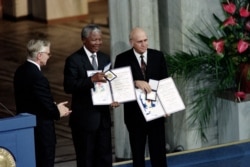South Africa’s last apartheid president, F.W. de Klerk, who shepherded the end of the country’s system of white minority rule and who shared a Nobel Peace Prize with Nelson Mandela for that work -- died Thursday at his home near Cape Town. He was 85.
In a statement, the F.W. de Klerk Foundation announced his death from mesothelioma, a form of cancer that affects the lungs. He had been ill for several years.
News of his death provoked a measured reaction from President Cyril Ramaphosa, who praised the man for his courage but also recalled the trauma that the racist apartheid system inflicted on the majority of South Africans. He also stopped short of declaring that de Klerk would receive a state funeral, as previous heads of state and apartheid-era luminaries have received.
“We are saddened because he did play a key role in ushering in democracy in our country,” Ramaphosa said. “He was the leader of a party that was largely discredited, in relation to the role that the National Party played in enforcing apartheid. But he had the courage to step away from the path that his party, that he led, had embarked upon from 1948, and we will remember him for that. And, of course, the policies that the apartheid regime espoused and implemented have wreaked a lot of havoc on millions and millions of South Africans and it was the havoc that many of our people will never forget, and have suffered from.”
Mandela’s charitable foundation also noted that the former president’s legacy is a mixed one, in a nation that is still deeply divided along racial and economic lines.
“De Klerk’s legacy is a big one,” Sello Hatang, chief executive of the Nelson Mandela Foundation, said in a statement. “It is also an uneven one, something South Africans are called to reckon with in this moment.”
Mandela died in 2013, at the age of 95.
The foundation of South African Nobel peace laureate Desmond Tutu was even more blunt, giving condolences but also noting that in recent years, de Klerk had defended the apartheid regime publicly.
“It is, however, sad that Mr. de Klerk missed the many chances he had to fully reconcile with all South Africans by acknowledging the full extent of the damage caused by apartheid,” said Piyushi Kotecha, CEO of the Desmond & Leah Tutu Legacy Foundation. “That damage is with us today. We are in many ways a broken society. It is as our founder, Archbishop Emeritus Desmond Tutu, has said, Mr. de Klerk could have gone down in history as a truly great South African statesman, but he eroded his stature and became a small man, lacking magnanimity and generosity of spirit.’”
De Klerk stunned the world in February of 1990, five months into his presidency, and less than three months after the collapse of the Berlin Wall, when he opened the way for an end to more than four decades of apartheid. Delivering a bombshell speech to parliament, he "unbanned" the African National Congress (ANC) and announced the release of its leader, Nelson Mandela after 27 years behind bars.






